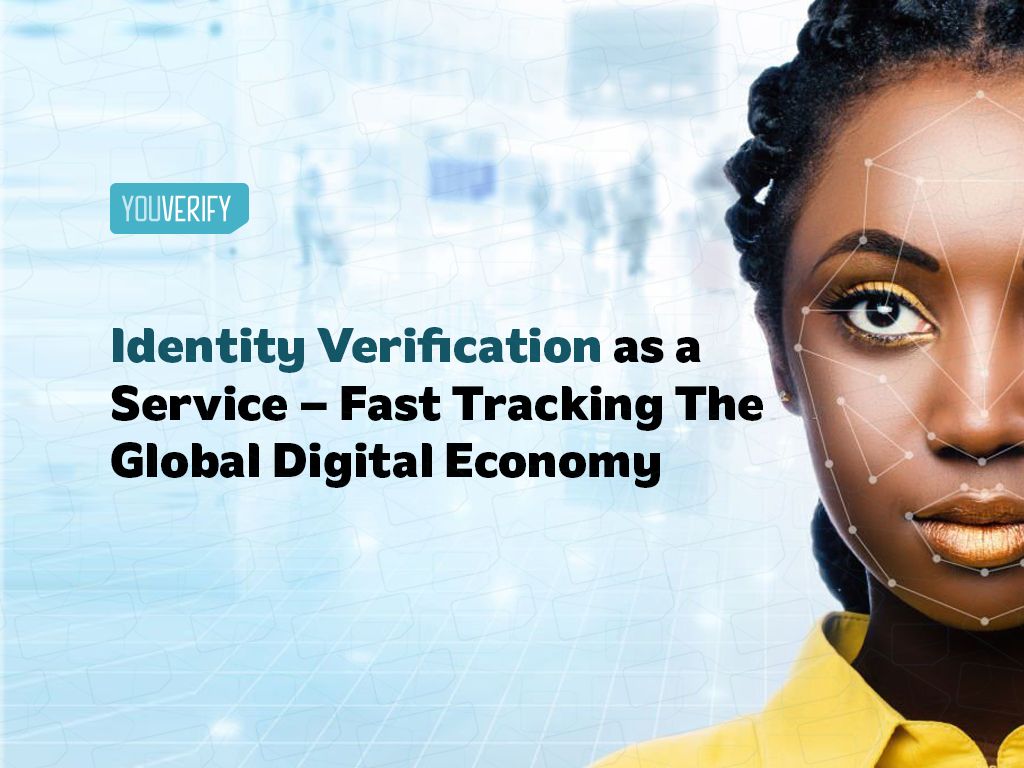The modern age demands modern solutions as opposed to the older archaic way of doing things. Today, businesses use identity verification to confirm the identity of customers and ensure compliance. Identity verification as a service ensures customers provide information associated with a real individual’s identity during Know Your Customer (KYC) and Anti Money Laundering (AML) compliance procedures.

With most businesses embracing remote/online registrations, online identity verification has become even more important as you can tell who you’re doing business with. Rightfully, knowing who you’re doing business with is a vital requirement as per governmental regulations. This is because it helps mitigate the risk of fraud as well as satisfy compliance requirements.
Here's an excellent example of how identity verification as a service is fast-tracking the global digital economy:
The need for Identity verification as a service
As technology improved and things went more online, the demand for identity verification as a service rose significantly. Unfortunately, the demand was first faced with poor supply, especially as people became more impatient. While many understand and fully embrace the need for security, they react negatively to slow and cloggy processes, which was what was available not very long ago.
Initially, identity verification was only attainable through manual slow processes that were both prone to error and lagging behind compared to present-day technology. Over time, groundbreaking companies like Youverify rose to become the answer. Today, with plug-in APIs, businesses can now add Youverify’s identity services to their existing platform or opt to migrate to the whole Youverify OS in its entirety. This helps businesses onboard customers quicker, focus on capturing more markets by outsourcing non-core functions and meet regulations. You can learn more here.
According to a report by globe news wire, identity verification is projected to grow to $8 Billion in 2021 to reach $17.7 Billion in 2026. This puts it at an impressive annual growth rate of 17.1%.
Identity Verification use cases
From research and real-life cases, there are different stages in the customer journey where identity verification is necessary or advised. For example, opening an account at the beginning of the customer journey or a customer trying to carry out a transaction along the journey itself. Identity verification checks should occur during the onboarding process of customers while opening an account. This is because is better to detect and prevent an illegal activity early than deal with the consequences and legal implications later.
Some of the most common identity verification use cases include:
- Business Account Opening
- Credit Underwriting
- KYC for Remittance
- KYC for Crypto
- KYC for Drivers
- KYC for 3rd Party Agent
Moving down the customer journey, it is also important to run identity verification when a customer makes significant changes to their account besides in-person activities like applying for a loan. This includes password reset, change of security questions, and change of address. These actions are basic account management activities that could leave the customer vulnerable to unwanted hacks and account takeover. Identity verification should be done to ensure it’s the customer actually requesting such changes.
Identity verification should be arranged sequentially as triggers for a flag. For example, If there’s a sudden large transfer of money from an account or multiple failed attempts to try login into an account.
What are the types of identity verification?
There are different types of identity verification solutions technologies and data points that businesses may use today. They include:
1. Electronic Identity Verification (eIDV)
Electronic Identity Verification (eIDV) is a technology that verifies an individual’s identity remotely using digital channels. It is one of the most common types of digital identity verification software. This type depends on data provided by the customer such as date of birth, name, address, and other significant data points. The process is completed by checking the information supplied against various databases of consumer data. This includes credit bureaus, government agencies, government databases, and more. At the end of the process, it determines verifies whether the person is truly who they claim to be or not.
2. Document verification
This process simply determines if an ID document is authentic or not. An ID document verification service leverage AI to extract important data from identity documents, making it one of the revolutionary means of verification for businesses and startups. It then proceeds to perform comparison checks of those data with other global document types. For example, it checks unique security features on the ID format of a customer driver’s license against the standard codes/ designs of a legit government driver’s license. If there is a positive match, the AI provides evidence that the document is legit or otherwise.
3. Knowledge-Based Authentication (KBA)
Knowledge-Based Authentication involves using the private information of an individual to prove that the person providing the identity information is the true owner. Previously, it used security questions like what is “What is your mother’s Maiden name?” or “What is the name of your first school?”
However, it has moved towards a more dynamic KBA to questions based on information that changes frequently.
4. Mobile ID
Our mobile phones are largely integrated into our identities today. Therefore, Mobil ID employs a similar method to eIDV to verify identities based on information from Mobile Network Operators (MNOs). This includes address verification, names, device information, phone number, and more. When put together, these data provide a valuable cluster of identity intelligence.
What identity verification service is best for my business?
The best identity verification solution for your business depends on the exact type of business it is. Before making this decision, it's best that you understand how each method operates and what they rely on. Each method relies on significantly different information to complete its respective verification process. This is why there’s no one best answer, instead ask yourself a few questions before making a choice. However, keep in mind that leveraging a no code compliance tool like vForms always helps as it simplifies the process.
Important questions include - what are the risk assessment factors? What are the compliance requirements? What are the identification requirements for the specific industry? Are there domestic or international expansion plans and how can I ensure the identity service caters for them?
Answering these questions in detail would help you make an informed decision. However, there are full package identity verification services like that of Youverify that leverage more than one type of identity verification to cater to businesses with varying needs.
Bottom line
Identity verification as a service is a very important part of today’s business both as a business itself and for helping other businesses. As a business owner, selecting the right identity verification service is a key decision that could determine its success or failure. This cuts across online and mobile businesses.
